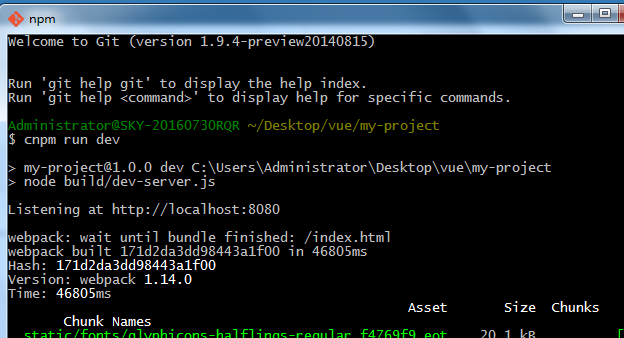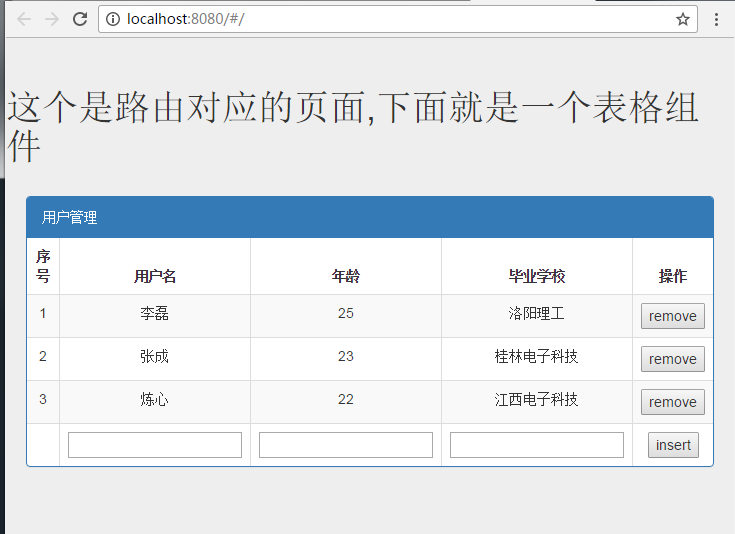жӮЁеҘҪпјҢзҷ»еҪ•еҗҺжүҚиғҪдёӢи®ўеҚ•е“ҰпјҒ
жӮЁеҘҪпјҢзҷ»еҪ•еҗҺжүҚиғҪдёӢи®ўеҚ•е“ҰпјҒ
иҝҷзҜҮж–Үз« дё»иҰҒд»Ӣз»ҚvueеҰӮдҪ•е®һзҺ°з®ҖеҚ•иЎЁж јз»„件пјҢж–Үдёӯд»Ӣз»Қзҡ„йқһеёёиҜҰз»ҶпјҢе…·жңүдёҖе®ҡзҡ„еҸӮиҖғд»·еҖјпјҢж„ҹе…ҙи¶Јзҡ„е°Ҹдјҷдјҙ们дёҖе®ҡиҰҒзңӢе®ҢпјҒ
VueжҳҜдёҖеҘ—з”ЁдәҺжһ„е»әз”ЁжҲ·з•Ңйқўзҡ„жёҗиҝӣејҸJavaScriptжЎҶжһ¶пјҢVueдёҺе…¶е®ғеӨ§еһӢжЎҶжһ¶зҡ„еҢәеҲ«жҳҜпјҢдҪҝз”ЁVueеҸҜд»ҘиҮӘеә•еҗ‘дёҠйҖҗеұӮеә”з”ЁпјҢе…¶ж ёеҝғеә“еҸӘе…іжіЁи§ҶеӣҫеұӮпјҢж–№дҫҝдёҺ第дёүж–№еә“е’ҢйЎ№зӣ®ж•ҙеҗҲпјҢдё”дҪҝз”ЁVueеҸҜд»ҘйҮҮз”ЁеҚ•ж–Ү件组件е’ҢVueз”ҹжҖҒзі»з»ҹж”ҜжҢҒзҡ„еә“ејҖеҸ‘еӨҚжқӮзҡ„еҚ•йЎөеә”з”ЁгҖӮ
жң¬жқҘжғіиҝҷдёҖе‘ЁеҒҡдёҖдёӘе…ідәҺvuexзҡ„жҖ»з»“зҡ„пјҢдҪҶжҳҜз”ұдәҺжңӢеҸӢеҸҚеә”иҜҙиҝҳдёҚзҹҘйҒ“еҰӮдҪ•з”ЁvueеҺ»еҶҷдёҖдёӘ组件пјҢжүҖд»ҘеңЁжӯӨеҶҷеҶҷдёҖзҜҮж–Үз« жқҘиҜҙжҳҺдёӢеҰӮдҪ•еҺ»еҶҷvueйЎөйқўжҲ–иҖ…组件гҖӮvueзҡ„ж ёеҝғжҖқжғіе°ұжҳҜ组件пјҢд»Җд№ҲжҳҜ组件呢пјҹжҢүз…§жҲ‘зҡ„зҗҶ解组件е°ұжҳҜиЈ…й…ҚйЎөйқўзҡ„йӣ¶д»¶пјҢжҜ”еҰӮдёҖиҫҶиҪҰжңүеӨ§еӨ§е°Ҹе°Ҹи®ёеӨҡйӣ¶д»¶з»„жҲҗпјҢйӮЈд№ҲеҗҢж ·зҡ„дёҖдёӘйЎөйқўпјҢд№ҹжҳҜжңүи®ёеӨҡ组件жһ„жҲҗзҡ„жҜ”еҰӮиҜҙеӨҙйғЁз»„件 жҢү钮组件зӯүзӯүпјҢvueдёүеӨ§ж ёеҝғ组件 и·Ҝз”ұ зҠ¶жҖҒз®ЎзҗҶпјҢи·Ҝз”ұжҺ§еҲ¶йЎөйқўзҡ„жёІжҹ“пјҢйЎөйқўз”ұ组件组жҲҗпјҢж•°жҚ®жңүvuexиҝӣиЎҢз®ЎзҗҶе’Ңж”№еҸҳгҖӮдёӢйқўжҲ‘дјҡд»ҘдёҖдёӘз®ҖеҚ•зҡ„жЎҲдҫӢжқҘиҜҙ
第дёҖжӯҘпјҡжһ„е»әдёҖдёӘз®ҖеҚ•зҡ„vueйЎ№зӣ®пјҢиҖҒ规зҹ©зӣҙжҺҘеңЁе‘Ҫд»ӨиЎҢиҫ“е…Ҙ
vue init webpack myproject cd my vue cnpm/npm install cnpm/npm run dev
жү§иЎҢз»“жһңеҰӮдёӢ

然еҗҺдҪ дјҡеңЁ8080з«ҜеҸЈзңӢеҲ°vueзҡ„ж Үеҝ—йЎөйқў
第дәҢжӯҘпјҡеҲҶжһҗзӣ®еҪ•з»“жһ„ дё»иҰҒжҳҜ组件е…ҘеҸЈapp.vueе’Ңmain.js
第дёүжӯҘпјҡеҶҷйЎөйқў
жҲ‘们еңЁapp.vueдёӢиҝҷж ·еҶҷ
<template>
<div id="wrapper">
<router-view></router-view>
</div>
</template>
<script>
export default {
data () {
return {
}
},
components: {
}
}
</script>еңЁmain.jsдёӯиҝҷж ·еҶҷ
import Vue from 'vue'
import App from './App'
import Home from './pages/Home.vue'
import VueRouter from 'vue-router'
import 'bootstrap/dist/css/bootstrap.css'
Vue.use(VueRouter)
const routes = [{
path: '/',
component: Home
}]
const router = new VueRouter({
routes
})
/* eslint-disable no-new */
new Vue({
el: '#app',
router,
template: '<App/>',
components: { App }
})main.jsдё»иҰҒеҢ…жӢ¬жЁЎеқ—еҜје…Ҙд»ҘеҸҠ组件еҜје…Ҙе’ҢжіЁеҶҢпјҢи·Ҝз”ұй…ҚзҪ®пјҢеҪ“然и·Ҝз”ұй…ҚзҪ®еҸҜд»ҘеҚ•зӢ¬еҶҷеҮәжқҘгҖӮ
з”ұдёҠйқўзҡ„и·Ҝз”ұй…ҚзҪ®еҸҜд»ҘзҹҘйҒ“еҪ“pathдёәвҖҳ/'ж—¶еҖҷпјҢжҲ‘们渲жҹ“еҲ°app.vueдёӯзҡ„йЎөйқўдёәhome.vueйЎөйқўпјҢеҰӮдёӢ
<template>
<div class="jumbotron">
<h2>иҝҷдёӘжҳҜи·Ҝз”ұеҜ№еә”зҡ„йЎөйқў,дёӢйқўе°ұжҳҜдёҖдёӘиЎЁж јз»„д»¶</h2>
<table-com/>
</div>
</template>
<script>
import table from '../components/Hello.vue'
export default {
data () {
return {
}
},
components: {
tableCom: table
}
}
</script>е…¶дёӯimport table from '../components/Hello.vue'иЎЁзӨәеҜје…ҘиҝҷдёӘtable组件еҲ°home.vueйЎөйқў
дҪҶжҳҜеҸӘеҜје…ҘиҖҢжІЎжңүжіЁеҶҢиҝҷдёӘ组件жҳҜж— ж•Ҳзҡ„пјҢе°ұеҘҪеғҸе®ҡд№үдәҶдёҖдёӘеҮҪж•°иҖҢжІЎжңүжү§иЎҢгҖӮжүҖд»ҘжҲ‘们йңҖиҰҒжіЁеҶҢиҝҷдёӘ组件
д№ҹе°ұжҳҜcomponents:{tableCom: table}ж„ҸжҖқжҳҜиҮӘе®ҡд№үдёҖдёӘtableComж ҮзӯҫжқҘжҳ е°„иҝҷдёӘ组件пјҢдҪҶжҳҜvue规е®ҡдҪҶж ҮзӯҫеҗҚиҝҮй•ҝзҡ„ж—¶еҖҷпјҢйңҖиҰҒд»ҘеҲҶејҖж–№ејҸеҺ»еҶҷжҜ”еҰӮtableCom иҰҒеҶҷжҲҗtable-com.
иҝҷж ·е°ұе®ҢжҲҗдәҶдёҖдёӘ组件зҡ„еҜје…Ҙе’ҢжіЁеҶҢпјҢдёӢйқўжҲ‘们жқҘе®ҢжҲҗиҝҷдёӘ组件
table.vueз•ҢйқўеҰӮдёӢ
<template>
<div id="app">
<div class="panel panel-primary">
<div class="panel-heading">з”ЁжҲ·з®ЎзҗҶ</div>
<table class="table table-bordered table-striped text-center">
<thead>
<tr>
<th>еәҸеҸ·</th>
<th>з”ЁжҲ·еҗҚ</th>
<th>е№ҙйҫ„</th>
<th>жҜ•дёҡеӯҰж Ў</th>
<th>ж“ҚдҪң</th>
</tr>
</thead>
<tbody>
<tr v-for ="(user,index) in users">
<td>{{index+1}}</td>
<td>{{user.name}}</td>
<td>{{user.age}}</td>
<td>{{user.school}}</td>
<td><button v-on:click="remove(index)">remove</button></td>
</tr>
<tr>
<td></td>
<td><input type="text" id="name" v-model="user.name"/></td>
<td><input type="text" id="age"v-model="user.age"/></td>
<td><input type="text" id="school"v-model="user.school"/></td>
<td><button @click="insert">insert</button></td>
</tr>
</tbody>
</table>
</div>
</div>
</template>
<script>
export default {
name: 'hello',
data () {
return {
user: {'name': '', 'age': '', 'school': ''},
users: [
{'name': 'жқҺзЈҠ', 'age': '25', 'school': 'жҙӣйҳізҗҶе·Ҙ'},
{'name': 'еј жҲҗ', 'age': '23', 'school': 'жЎӮжһ—з”өеӯҗ科жҠҖ'},
{'name': 'зӮјеҝғ', 'age': '22', 'school': 'жұҹиҘҝз”өеӯҗ科жҠҖ'}
]
}
},
methods: {
insert: function () {
this.users.push(this.user)
},
remove: function (index) {
this.users.splice(index, 1)
}
}
}
</script><!-- Add "scoped" attribute to limit CSS to this component only -->
<style scoped>
h2, h3 {
font-weight: normal;
}
ul {
list-style-type: none;
padding: 0;
}
li {
display: inline-block;
margin: 0 10px;
}
a {
color: #42b983;
}
tr,th{
text-align:center;
}
</style>иҝҷдёӘ组件е®һзҺ°дәҶз®ҖеҚ•зҡ„еўһеҲ еҠҹиғҪпјҢдё»иҰҒжҳҜеҜ№dataж•°жҚ®зҡ„дҝ®ж”№пјҢжҲ‘们иҰҒжҳҺзҷҪпјҢжҲ‘们平常дҪҝз”Ёзҡ„jqueryеҸӘжҳҜеҜ№domиҠӮзӮ№зҡ„ж“ҚдҪңпјҢжҜ”еҰӮжҲ‘们иҰҒж”№еҸҳдёҖдёӘж•°жҚ®жҲ‘们е°ұиҰҒйҰ–е…ҲиҺ·еҸ–dom然еҗҺйҖҡиҝҮjqueryзҡ„ж–№жі•жқҘиҺ·еҸ–еҖјпјҢиҖҢvueеҲҷдёҚ然е®ғжҳҜеҜ№dataж•°жҚ®иҝӣиЎҢж“ҚдҪңпјҢж•°жҚ®еҸҢеҗ‘з»‘е®ҡпјҢж•°жҚ®ж”№еҸҳеҲҷи§Ҷеӣҫж”№еҸҳпјҢеҗҢж ·и§Ҷеӣҫж”№еҸҳеҲҷж•°жҚ®ж”№еҸҳгҖӮ

д»ҘдёҠжҳҜвҖңvueеҰӮдҪ•е®һзҺ°з®ҖеҚ•иЎЁж јз»„件вҖқиҝҷзҜҮж–Үз« зҡ„жүҖжңүеҶ…е®№пјҢж„ҹи°ўеҗ„дҪҚзҡ„йҳ…иҜ»пјҒеёҢжңӣеҲҶдә«зҡ„еҶ…е®№еҜ№еӨ§е®¶жңүеё®еҠ©пјҢжӣҙеӨҡзӣёе…ізҹҘиҜҶпјҢж¬ўиҝҺе…іжіЁдәҝйҖҹдә‘иЎҢдёҡиө„и®Ҝйў‘йҒ“пјҒ
е…ҚиҙЈеЈ°жҳҺпјҡжң¬з«ҷеҸ‘еёғзҡ„еҶ…е®№пјҲеӣҫзүҮгҖҒи§Ҷйў‘е’Ңж–Үеӯ—пјүд»ҘеҺҹеҲӣгҖҒиҪ¬иҪҪе’ҢеҲҶдә«дёәдё»пјҢж–Үз« и§ӮзӮ№дёҚд»ЈиЎЁжң¬зҪ‘з«ҷз«ӢеңәпјҢеҰӮжһңж¶үеҸҠдҫөжқғиҜ·иҒ”зі»з«ҷй•ҝйӮ®з®ұпјҡis@yisu.comиҝӣиЎҢдёҫжҠҘпјҢ并жҸҗдҫӣзӣёе…іиҜҒжҚ®пјҢдёҖз»ҸжҹҘе®һпјҢе°Ҷз«ӢеҲ»еҲ йҷӨж¶үе«ҢдҫөжқғеҶ…е®№гҖӮ